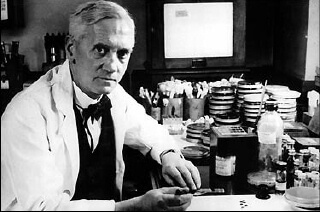
Alexander Fleming, the scientist who discovered penicillin, is one of the most well-known bacteriologists of all time. His discoveries and contributions to the scientific and medical fields are invaluable; many people benefit from his research today and will continue to do so.
1. Tight-knit Family
Fleming, born in Lochfield, Scotland, was British. He grew up on the very large farm his father owned. He even took over the farm when his father died. His brother, Tom, left home to study medicine and opened a practice in London. As his family was very important to him, he lived with his siblings in London.
2. Joining the Scottish Regiment
When the Boer War sprung up in 1900 between the United Kingdom and the colonies in Southern Africa, he and two of his brothers joined the military, specifically the Scottish regiment.
3. Choosing a Medical School
Alexander and his brothers were interested in going to medical school and all earned top scores on their examinations. Because of his very successful education in his early years and his high exam scores, Alexander got to choose which medical school he wanted to attend. He attended St. Mary’s in London, decided to study bacteriology and graduated in 1906.
4. Salyarsan
Paul Ehrlich, a German scientist and chemist, had discovered how to treat syphilis with a chemical called Salyarsan. There were only a handful of physicians who were entrusted to administer the treatment and Alec, as he was sometimes called, was one them.
5. Military Service
Dr. Fleming started to study which enzymes attacked certain types of bacteria, but his studies were interrupted by World War I. He served in the War as a Captain of the Army Medical Corps. He was very concerned that many soldiers were dying from fairly simple infections and were just unable to get the treatments they needed in time. This may have been his main source of inspiration to continue with his research and try to find a way to create successful antibiotics.
6. Accidental Discovery
It is said that the discovery of penicillin was actually an accident. He was known to be somewhat disorganized in his lab. While he was searching for a strong enzyme to treat bacterial infections, he was preparing to wash several Petri dishes and took a closer look at one. Mold was growing in one of the dishes, which was to be expected, but he noticed that the mold had also killed the staphylococcus culture that was in the dish. When he took a sample of the mold he discovered that it was in the penicillium family and he called in penicillin. It was very important that it was non-toxic to humans and has been one of the most successful treatments of bacteria ever discovered.
7. Reporting Initial Findings
His findings were reported to the medical world in 1929, but very few initially took interest in his findings. He published a report in the British Journal of Experimental Pathology and continued working on the mold for several years. The research started going slower when some of the other chemists and mold specialists working on the project died or moved away.
8. Interest in Penicillin
Interest in penicillin wasn’t really very strong until World War II began and it was again needed to treat those who were dying from simple infections. Along with Howard Florey and Ernst Chain, the penicillin mold was purified and became a very viable antibiotic all over the world.
9. Knighted in 1944
Dr. Fleming was knighted in 1944 for his contributions to the medical field. He also received the Nobel Prize for physiology and medicine in 1945.
10. Death of a Pioneer
Dr. Alexander Fleming was 73 years old when he died on March 11, 1955. He was buried in the St. Paul’s Cathedral in London.